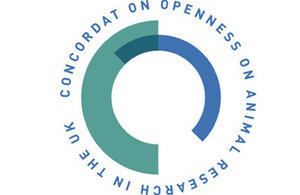APHA signs Concordat on Openness on Animal Research
APHA joins over 90 organisations by signing the Concordat on Openness on Animal Research.

Concordat Logo
The Animal and Plant Health Agency (APHA) joins over 90 organisations including universities, charities, commercial companies and research councils, by signing the Concordat on Openness on Animal Research.
The objective of the Concordat, which is supported by Professor Sir Mark Walport, the government’s Chief Scientific Advisor, is to increase awareness and understanding among the general public about the use of animals in science where no alternatives exist.
APHA’s science is aimed at protecting Great Britain from the threat and impact of a wide variety of animal and wildlife diseases and issues including bovine TB, food-borne bacteria and antimicrobial resistance, many of which can also affect humans. This work provides scientific evidence that supports policy development for the government, European Union and internationally.
Signatories to the Concordat undertake to fulfil 4 commitments:
- We will be clear about when, how and why we use animals in research
- We will enhance our communications with the media and the public about our research using animals
- We will be proactive in providing opportunities for the public to find out about research using animals
- We will report on progress annually and share our experiences
APHA’s main areas of research include:
- bovine TB and development of vaccines and diagnostic tests for badgers and cattle
- bacterial diseases and food safety, including food-borne bacteria such as Salmonella, Campylobacter and Escherichia coli and bacterial pathogens such as Brucella and Mycoplasma
- viral diseases including avian and mammalian viruses such as Newcastle disease, influenza and classical swine fever, zoonotic and wildlife viruses such as rabies and vector-borne diseases
- transmissible spongiform encephalopathies (TSEs)
- wildlife management including wildlife diseases, human-wildlife conflicts and studies of welfare and behaviour.
See further information on the Concordat on Openness on Animal Research